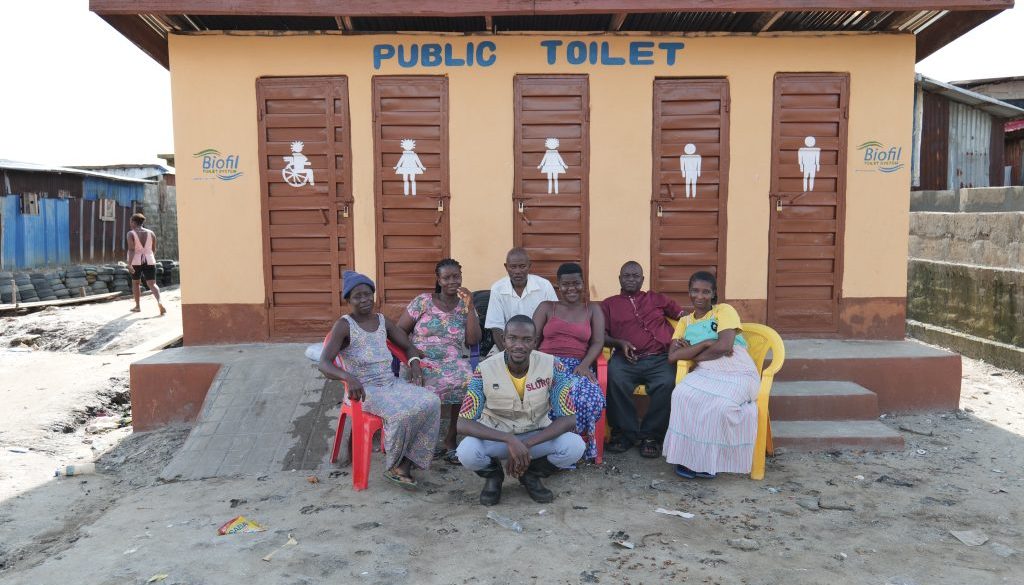Inclusive sanitation: Working with informal settlement residents in Freetown, Sierra Leone to address sanitation challenges
Read about the inclusive community based approach to addressing sanitation issues in Freetown informal settlements in this blog by Sullaiman Fullah, Ishmail Conteh, Dora Vangahun and Abu Conteh.
In the informal settlements of Freetown sanitation remains a huge challenge, particularly access to decent toilets. This can be due to constraints on digging land (in hilly areas) or limited space available for construction. Limited access to toilet facilities in informal settlements often leads to the unsafe disposal of human waste. As a result, it is difficult to maintain proper sanitation in these areas. Some residents share the limited toilets available while others defecate openly on the soil or in open drains leading to an increased incidence of water-borne diseases such as cholera, diarrhoea, and typhoid (Macarthy et al., 2018)[1]. Cockle Bay, a coastal informal settlement located on the Aberdeen creek of Freetown is no exception to these poor sanitation challenges. The sanitation problem has been a great concern for residents’ health and the environment. Most households use hanging toilets connected to the sea or large drainages, and poorly maintained pit latrines which are unhygienic and can overflow, particularly during the rainy season. Some residents are still practicing open defecation in the community due to a lack of access to toilet facilities exposing them to an increased risk of infectious disease outbreaks.
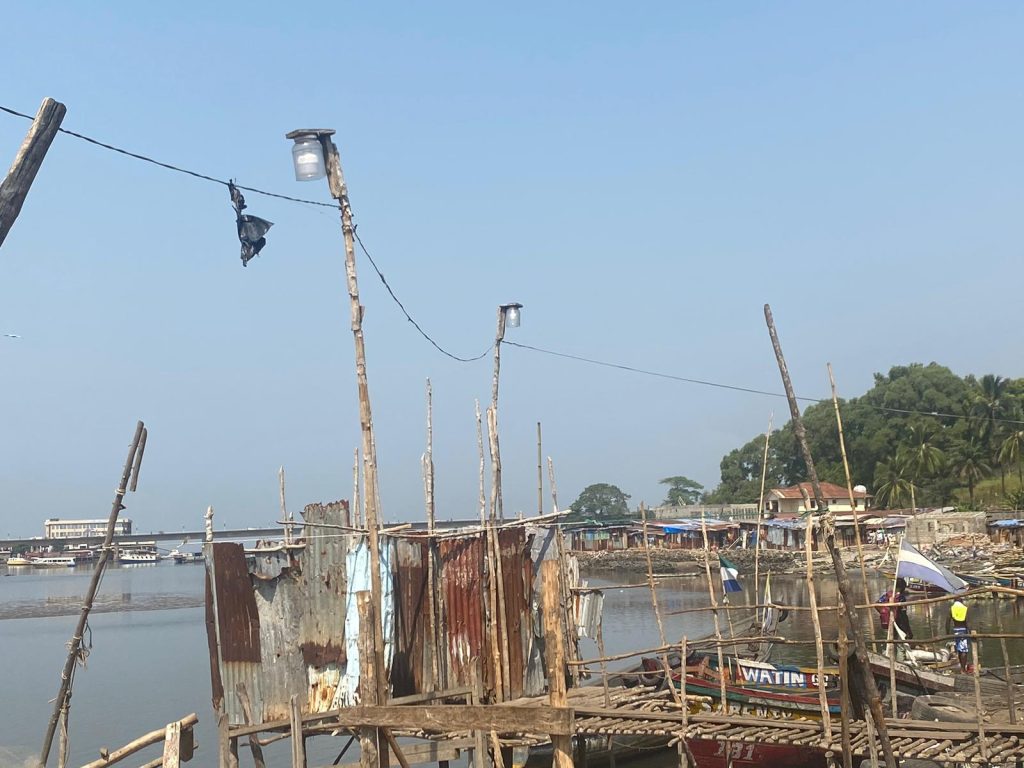
A hanging toilet in Cockle Bay.
ARISE and CBPR
The Community-Based Participatory Research (CBPR) approach of ARISE allows researchers to engage communities as active participants during the research, which is crucial for the successful implementation of the project. At the inception of the research project, community members were selected through a competitive, transparent, and inclusive process to act as co-researchers. Their capacity was built through training on participatory and qualitative methods (e.g. social mapping, well-being ranking, Venn diagramming, narrative and key informant interviews, and GIS mapping), and quantitative methods (health and well-being surveys). This allowed them to better understand the community issues and ensured that co-researchers and other community stakeholders were involved in every stage of the ARISE research process. The CBPR approach further led to the co-designing of small-scale interventions across the three study sites, including the construction of the Biofil toilet in Cockle Bay to address the community’s dire sanitation challenges.
Community engagement
Before construction began, the research team conducted several engagement events with co-researchers and community stakeholders. These events reaffirmed the community’s need for a safe toilet facility. During the initial engagement with co-researchers, concerns about a site for construction were raised, prompting two additional meetings to select a suitable site. In a general meeting, two potential sites were selected, but these were later nulled due to technical advice relating to their closeness to the sea, proximity to Aberdeen Bridge, and the risk of demolition by relevant government authorities. The final site was selected at Elet View. It was unanimously agreed upon by community stakeholders in consultation with community residents.
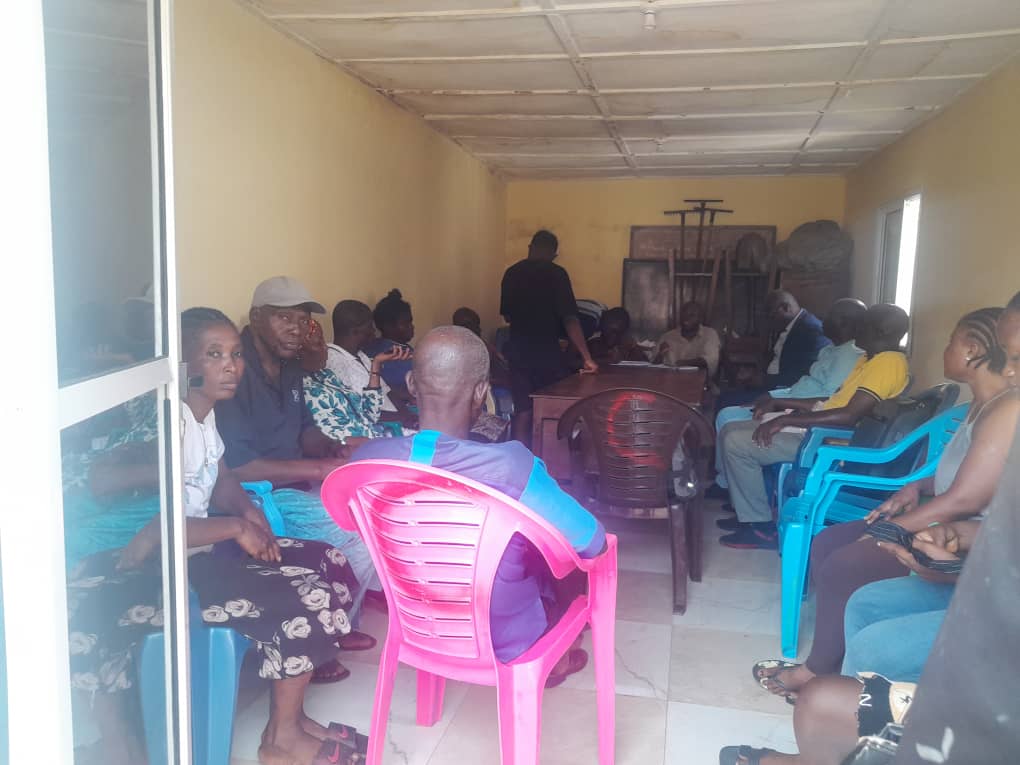
Community engagement for the selection of construction site. Photo credit: Ibrahim Bakarr Bangura.
Construction
The construction lasted for one and a half months, yielding valuable insights at each stage of the work. To ensure that deliverables were met and building standards were adhered to, the ARISE Sierra Leone Urban Research Centre (SLURC) team conducted regular monitoring of the implementation activities and evaluated each phase of the construction to assess progress and address challenges that emerged.
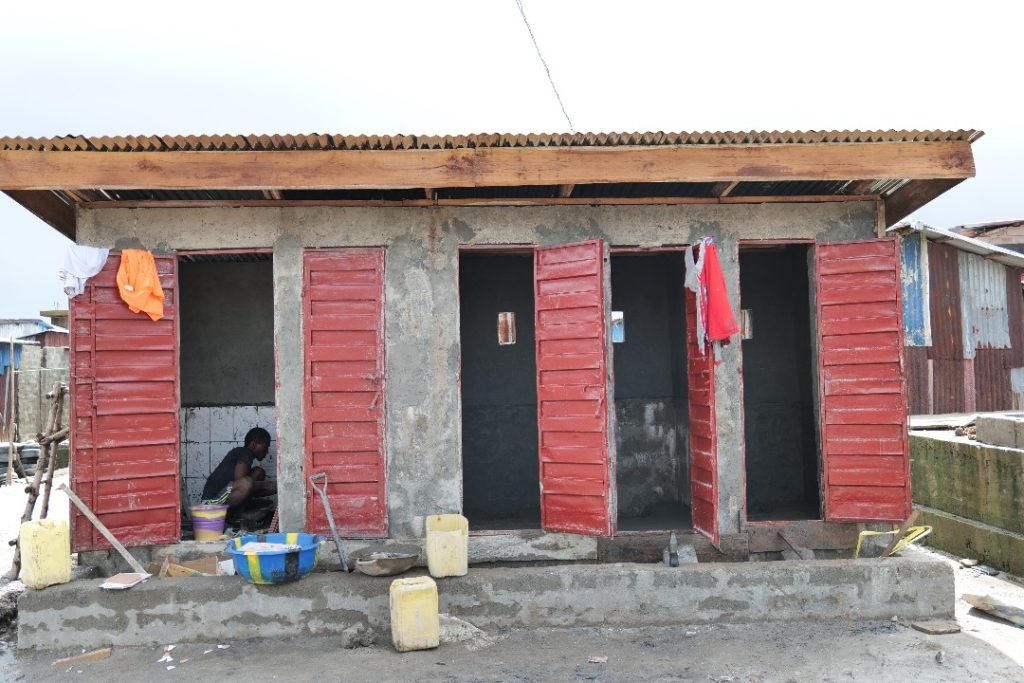
Affixing tiles in the toilet cubicles. Photo credit: Sullaiman Fullah
Biofil toilet in Cockle Bay
The toilet facility was designed with two digesters (5ft × 6ft) and six-compartment units to accommodate many users. Two of the cubicles (one at the front and the other at the back) are specifically designed for individuals with physical disabilities, featuring sloped ramps for wheelchair access. The remaining four rooms are designated for able-bodied users – two for men and two for women. This inclusive design promotes equity by ensuring accessibility for all and fosters a sense of community ownership and shared responsibility in maintaining the facility.
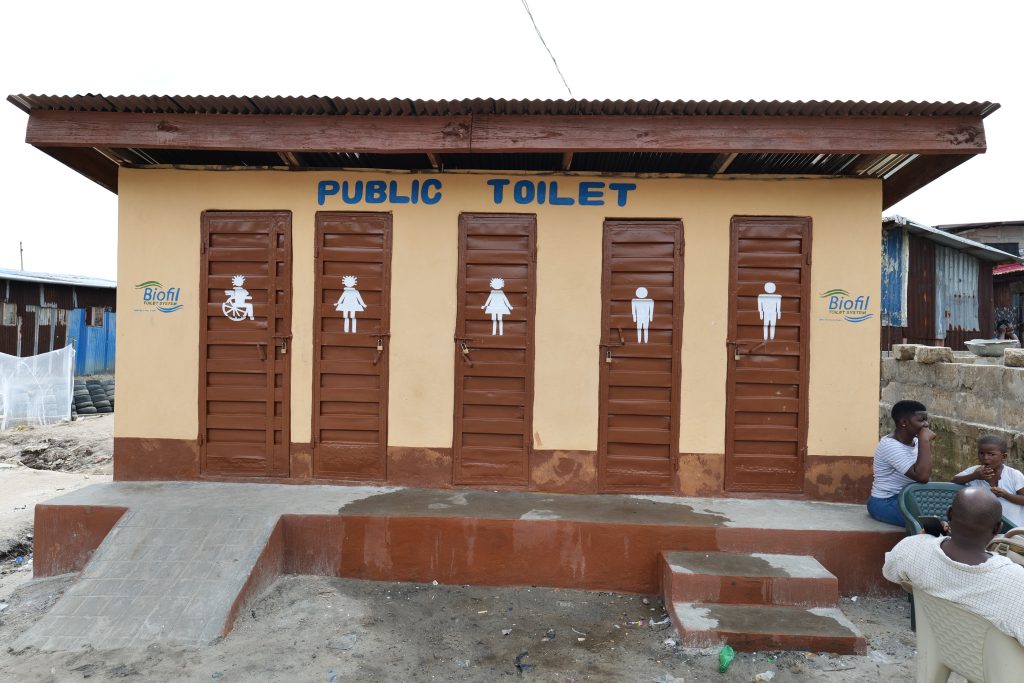
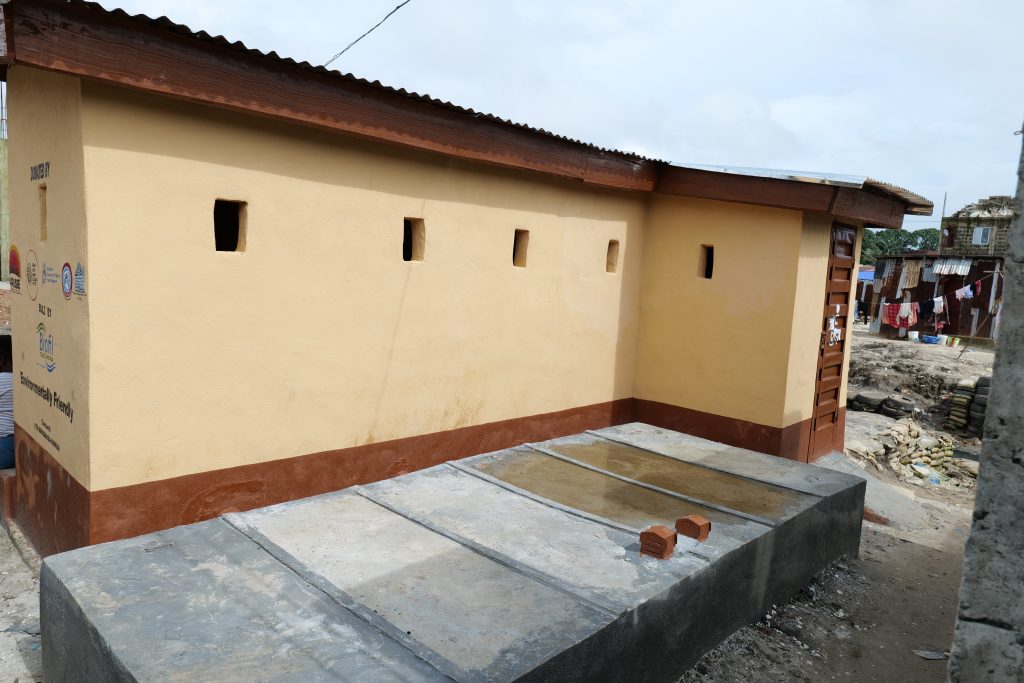
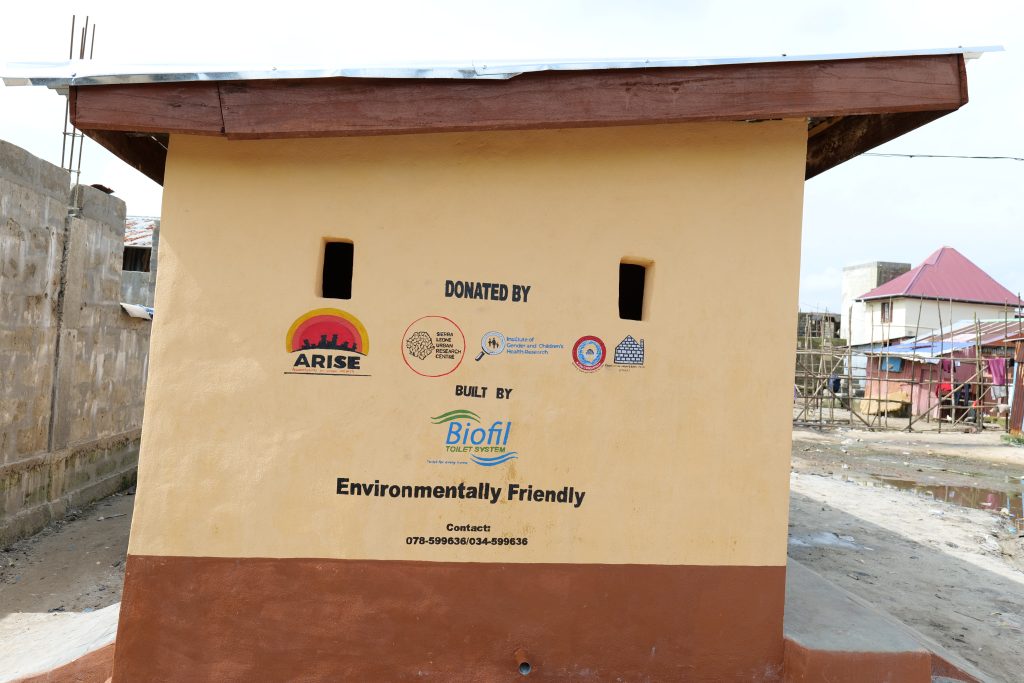
Establishment of management committee
To ensure sustainable use of the toilet facility, the SLURC research team, and community co-researchers facilitated the establishment of a women-led management committee to oversee the facility’s operations and the formulation of by-laws. The event featured an inclusive and participatory selection process to ensure proper usage, maintenance, and accountability of the toilet operations. The Biofil toilet experts subsequently trained the committee members on best practices for the use of the toilet facility. To sustain the learnings of the training, SLURC designed sanitation stickers relating to the use and maintenance of the facility which were posted outside together with the by-laws.
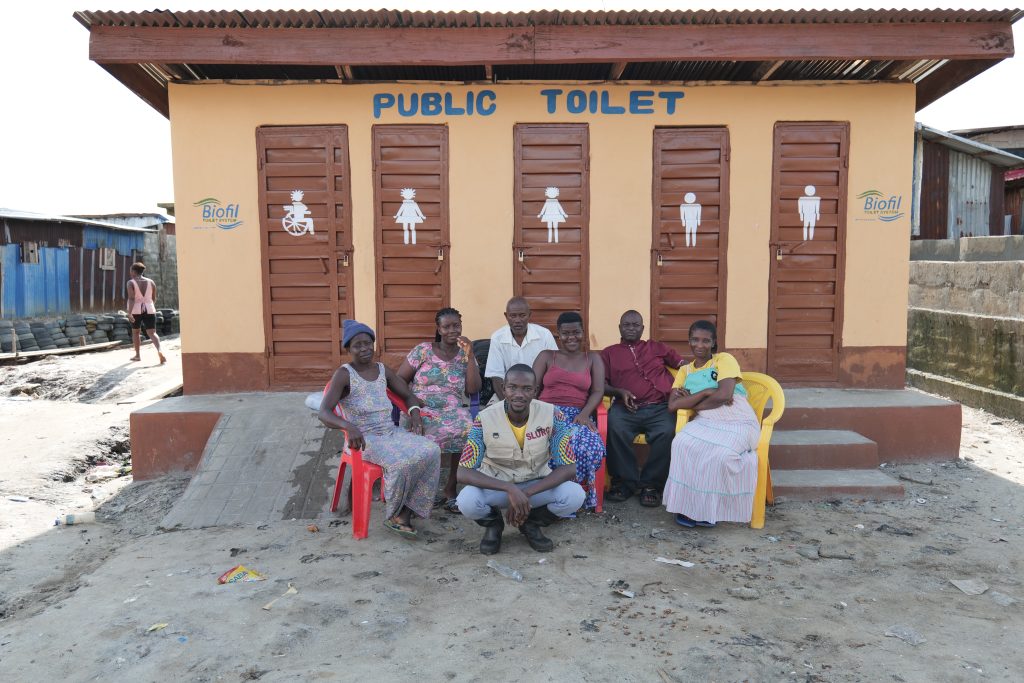
The management committee with Sullaiman Fullah, a researcher at SLURC. Photo credit: Emmanuel M. Kamara
Handing-over of the facility
The handing-over event gathered together the ARISE Sierra Leone team, media, community members, and community stakeholders. The Executive Director of SLURC, Dr. Joseph Mustapha Macarthy, highlighted in his statement that the installation of Biofil toilet in Cockle Bay was in response to the community’s reliance on inadequate and unhygienic facilities, such as hanging toilets and open sewage. He emphasised that the new environmentally friendly toilet aimed to improve hygiene and sanitation in the community. He proceeded by officially opening and handing over the toilet to community leaders and the management committee and called on them to ensure proper usage and maintenance of the facility. Mr. Francis Reffell, Chairman of the Centre of Dialogue on Human Settlements and Poverty Alleviation (CODOHSAPA), encouraged residents to work together to sustain the new toilet facility. Vincent Sesay, a community stakeholder, expressed his gratitude and commended SLURC, the ARISE team, and the funders for their invaluable effort in providing a decent communal toilet facility in Cockle Bay, emphasising its significance to minimising health risks from the use of unhygienic toilet facilities.
The benefits of the Biofil toilet
The ARISE Responsive Fund support for the Biofil toilet has enabled residents to have access to a hygienic and safe toilet facility in the community, which has greatly helped to mitigate health risks related to poor sanitation. For the first time, residents now use a toilet that is not only hygienic but also eco-friendly. Below are some of the benefits:
- Minimise health risks: The Biofil toilet discourages residents from practicing open defecation and minimises the risks of water contamination thereby reducing the incidence of waterborne diseases and the likelihood of disease outbreaks.
- Maintain privacy and dignity of residents: Previously, many residents especially women and children had to depend on poorly maintained pit latrines or unsanitary public toilets. The Biofil toilet provides them with a private and dignified place to use, hence promoting an improved quality of life.
- Protection of the environment: The toilet’s unique design ensures that waste is properly treated on the site thereby preventing pollution to nearby water bodies. This helps to protect and safeguard the coastal environment of the community.
Challenges
During our initial discussions with co-researchers, they raised concerns about land issues in the community, as much of the land has been reclaimed by private individuals. This caused a huge challenge to secure an appropriate site.
The project was also implemented during the peak of the rainy season. This effected various phases, from community engagement and mobilisation to construction. In some cases, community engagement sessions were cancelled due to torrential rainfall that hindered the mobility of staff and transportation of materials to the site.
Finally, during the project we struggled with managing community expectations. Although some residents actively participated, it became clear that many others expected compensation for any work they were involved in during the implementation of the project.
Conclusion
This sanitation intervention was implemented following the ARISE core values of equity, inclusion, participation, and empowerment. These values emphasised that the voices of residents in informal urban settlements are involved in research from data collection and analysis to implementation and design of interventions. This participatory and inclusive approach addressed the urgent sanitation issues in the community and helps build trust, strengthening local capacity-building, and empowering residents to take action and protect their environment. Through community engagements and collaboration, a hygienic and eco-friendly solution has been provided to improve the quality of life of residents. The inclusive design of the facility ensures accessibility for all, and the management of the toilets promotes equity and communal responsibility. Despite challenges such as land acquisition, heavy rainfall, and community expectations, the project successfully provided a dignified, safe, and sustainable sanitation option, reducing health risks and protecting the environment. It is essential to replicate such equity-driven and participatory methods in other informal settlements to effectively address sanitation problems, improve public health, and protect the environment.
[1] Macarthy, J., Conteh, A., Sellu, S. A., & Doughty, T. (2018). Water and Sanitation challenges and impact on health in informal settlements.
